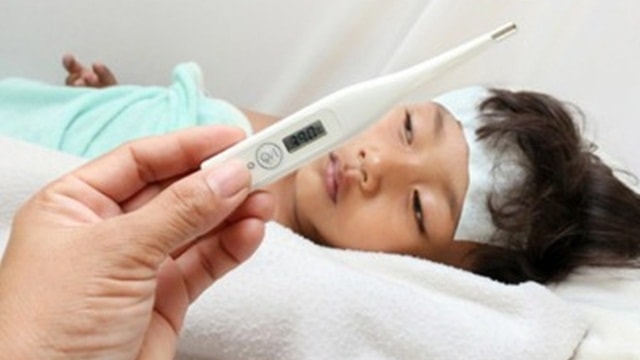4 warning signs of severe flu in children
When children have high fever, do not respond to antipyretics, have difficulty breathing, rapid breathing, convulsions, fatigue, poor appetite... parents need to take them to the hospital immediately.
Influenza is an acute respiratory infectious disease caused by influenza virus with symptoms of fever, headache, muscle aches, fatigue, runny nose, sore throat and cough. The disease is usually benign, mild and recovers within 2-7 days but is easily spread and can develop into a large epidemic. Therefore, when children have influenza, parents should note the following:
Fever reducer
When a child has a fever above 38.5 degrees Celsius, parents need to:
- Loosen the child's clothes.
- Apply warm compresses to the forehead, armpits, and groin. The temperature of the compress water is determined by dipping the adult's elbow into the basin of water. If it feels warm, it is fine.
- Give your child fever-reducing medicine as prescribed by your doctor, repeat every 4-6 hours if the fever is above 38.5 degrees.
|
Respiratory hygiene
- Nose and mouth hygiene: Use soft tissues to wipe your nose and saliva, then throw them away immediately after use. Do not use gauze towels because after each wiping, if you do not change to a new towel and reuse an old towel, the virus will still stick to the towel.
- Every day, drop 9 parts per thousand sodium chloride physiological saline solution into the child's eyes and nose; gargle with physiological saline or diluted saline for older children.
- Regularly clean hands with soap and clean water (clean both the caregiver's hands and the child's), avoid touching eyes, nose, and mouth.
Nutrition
- Feed your child nutritious, soft, easy to digest, easy to swallow foods: porridge, milk, fruit and drink lots of water.
- Increase breastfeeding if the child is still breastfeeding.
Infection control room
- Relatively isolate children: limit contact with healthy children, instruct them to cover their mouth and nose when coughing and sneezing, preferably with a cloth or tissue.
- Wear a mask when taking care of children.
- Bathe your baby in warm water in a draft-free room to avoid catching a cold.
When should I take my child to a medical facility?
When children have the following symptoms:
- Continuous high fever of 39ºC or higher, not responding to antipyretics.
- Convulsion.
- Children are lethargic, tired, eat poorly, vomit a lot, refuse to eat or breastfeed, have cold hands and feet.
- Children have difficulty breathing, rapid breathing.
How to prevent disease
- Get a flu vaccine.
- Sick children must be isolated and caregivers must wear masks to prevent infection.
- Make sure the place is airy, clean, and has plenty of light; clean and sanitize the house regularly.



